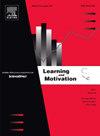Influence of digital game-based learning on social collaboration, problem-solving skills, and motivation: An integrative approach of expectancy-value theory and flow theory
IF 1.7
4区 心理学
Q3 PSYCHOLOGY, BIOLOGICAL
引用次数: 0
Abstract
Digital game-based learning (DGBL) has increasingly attracted scholarly attention for its potential to enhance learners’ related constructs across diverse educational contexts. While its prominence grows, few studies have systematically examined its impact on English as a Foreign Language (EFL) learners’ social collaboration, problem-solving skills, and motivation, particularly through the lenses of Expectancy-Value Theory and Flow Theory in the Chinese context. To address this research gap, the present study explored the effects of the DGBL on Chinese EFL learners’ social collaboration, problem-solving skills, and motivation using a mixed-methods approach. The participants including 191 male and female students were randomly assigned to either an experimental group (EG), which engaged in the DGBL activities, or a control group (CG), which followed traditional instruction. Data were collected via pre- and post-intervention questionnaires assessing social collaboration, problem-solving skills, and motivation, with semi-structured interviews providing deeper insights into students’ perceptions. Findings revealed that the EG significantly outperformed the CG in all measured domains. Quantitative results indicated substantial gains in social collaboration, problem-solving skills, and motivation, while qualitative data underscored the participants’ positive views of DGBL’s effectiveness. These results suggest that DGBL is a potent tool for enhancing both cognitive and social dimensions of EFL learning. By fostering an interactive, learner-centered environment, the DGBL offers EFL teachers and stakeholders valuable opportunities to strengthen students’ social, cognitive, and affective development.
基于数字游戏的学习对社会协作、问题解决能力和动机的影响:期望价值理论和心流理论的综合研究
基于数字游戏的学习(Digital Game-based Learning,DGBL)因其在不同教育背景下提高学习者相关能力的潜力而日益受到学术界的关注。尽管其重要性日益凸显,但很少有研究系统地考察了它对英语作为外语(EFL)学习者的社会协作、问题解决技能和学习动机的影响,尤其是通过期望-价值理论(Expectancy-Value Theory)和流动理论(Flow Theory)在中国语境下的影响。针对这一研究空白,本研究采用混合方法探讨了 DGBL 对中国 EFL 学习者的社交协作、问题解决能力和学习动机的影响。包括 191 名男女学生在内的参与者被随机分配到参与 DGBL 活动的实验组(EG)或接受传统教学的对照组(CG)。通过干预前和干预后的问卷收集数据,评估社交协作、解决问题的技能和动机,并通过半结构化访谈深入了解学生的看法。研究结果表明,在所有测量领域,EG 都明显优于 CG。定量结果表明,学生在社会协作、解决问题的技能和积极性方面都有很大提高,而定性数据则强调了参与者对 DGBL 效果的积极看法。这些结果表明,DGBL 是提高 EFL 学习认知和社会维度的有效工具。通过营造以学习者为中心的互动环境,DGBL 为 EFL 教师和利益相关者提供了加强学生社会、认知和情感发展的宝贵机会。
本文章由计算机程序翻译,如有差异,请以英文原文为准。
求助全文
约1分钟内获得全文
求助全文
来源期刊

Learning and Motivation
Multiple-
CiteScore
2.90
自引率
0.00%
发文量
53
期刊介绍:
Learning and Motivation features original experimental research devoted to the analysis of basic phenomena and mechanisms of learning, memory, and motivation. These studies, involving either animal or human subjects, examine behavioral, biological, and evolutionary influences on the learning and motivation processes, and often report on an integrated series of experiments that advance knowledge in this field. Theoretical papers and shorter reports are also considered.
 求助内容:
求助内容: 应助结果提醒方式:
应助结果提醒方式:


